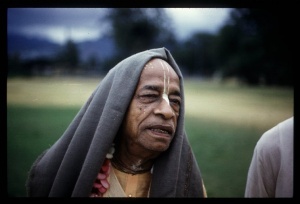SB 10.51.31: Difference between revisions
m (1 revision(s)) |
No edit summary |
||
| Line 1: | Line 1: | ||
{{info | {{info | ||
|speaker=King Mucukunda | |speaker=King Mucukunda | ||
|listener=Lord | |listener=Lord Kṛṣṇa the Supreme Personality of Godhead | ||
}} | }} | ||
[[Category:Srimad-Bhagavatam - Canto 10 Chapter 51]] | |||
[[Category:Bhagavatam Verses Spoken by Mucukunda Maharaja - Vanisource|105131]] | |||
<div style="float:left">'''[[Srimad-Bhagavatam]] - [[SB 10|Tenth Canto]] - [[SB 10.51: The Deliverance of Mucukunda|Chapter 51: The Deliverance of Mucukunda]]'''</div> | |||
<div style="float:right">[[File:Go-previous.png|link=SB 10.51.30]] '''[[SB 10.51.30]] - [[SB 10.51.32]]''' [[File:Go-next.png|link=SB 10.51.32]]</div> | |||
{{RandomImage}} | |||
{{SBnotice}} | |||
==== TEXT 31 ==== | ==== TEXT 31 ==== | ||
<div | <div class="verse"> | ||
vayaṁ tu puruṣa-vyāghra | :vayaṁ tu puruṣa-vyāghra | ||
aikṣvākāḥ kṣatra-bandhavaḥ | :aikṣvākāḥ kṣatra-bandhavaḥ | ||
mucukunda iti prokto | :mucukunda iti prokto | ||
yauvanāśvātmajaḥ prabho | :yauvanāśvātmajaḥ prabho | ||
</div> | </div> | ||
| Line 17: | Line 22: | ||
==== SYNONYMS ==== | ==== SYNONYMS ==== | ||
<div | <div class="synonyms"> | ||
''vayam''—we; ''tu''—on the other hand; ''puruṣa''—among men; ''vyāghra''—O tiger; ''aikṣvākāḥ''—descendants of Ikṣvāku; ''kṣatra''—of ''kṣatriyas''; ''bandhavaḥ''—family members; ''mucukundaḥ''—Mucukunda; ''iti''—thus; ''proktaḥ''—called; ''yauvanāśva''—of Yauvanāśva (Māndhātā, the son of Yuvanāśva); ''ātma-jaḥ''—the son; ''prabho''—O Lord. | |||
</div> | </div> | ||
{{SBcollapse}} | |||
==== TRANSLATION ==== | ==== TRANSLATION ==== | ||
<div | <div class="translation"> | ||
As for ourselves, O tiger among men, we belong to a family of fallen kṣatriyas, descendants of King Ikṣvāku. My name is Mucukunda, my Lord, and I am the son of Yauvanāśva. | As for ourselves, O tiger among men, we belong to a family of fallen kṣatriyas, descendants of King Ikṣvāku. My name is Mucukunda, my Lord, and I am the son of Yauvanāśva. | ||
</div> | </div> | ||
| Line 31: | Line 36: | ||
==== PURPORT ==== | ==== PURPORT ==== | ||
<div | <div class="purport"> | ||
It is common in Vedic culture that a kṣatriya will humbly introduce himself as kṣatra-bandhu, a mere relative in a kṣatriya family, or in other words a fallen kṣatriya. In ancient Vedic culture, to claim a particular status on the basis of one's family relations was itself indicative of a fallen position. Kṣatriyas and brāhmaṇas should be given status according to their merit, by their qualities of work and character. When the caste system in India became degraded, people proudly claimed to be relatives of kṣatriyas or brāhmaṇas, though in the past such a claim, unaccompanied by tangible qualifications, indicated a fallen position. | It is common in Vedic culture that a ''kṣatriya'' will humbly introduce himself as ''kṣatra-bandhu'', a mere relative in a ''kṣatriya'' family, or in other words a fallen ''kṣatriya''. In ancient Vedic culture, to claim a particular status on the basis of one's family relations was itself indicative of a fallen position. ''Kṣatriyas'' and ''brāhmaṇas'' should be given status according to their merit, by their qualities of work and character. When the caste system in India became degraded, people proudly claimed to be relatives of ''kṣatriyas'' or ''brāhmaṇas'', though in the past such a claim, unaccompanied by tangible qualifications, indicated a fallen position. | ||
</div> | </div> | ||
__NOTOC__ | </div> | ||
</div> | |||
<div style="float:right">[[File:Go-previous.png|link=SB 10.51.30]] '''[[SB 10.51.30]] - [[SB 10.51.32]]''' [[File:Go-next.png|link=SB 10.51.32]]</div> | |||
__NOTOC__ | |||
__NOEDITSECTION__ | |||
Revision as of 04:41, 24 May 2021

A.C. Bhaktivedanta Swami Prabhupada
Please note: The synonyms, translation and purport of this verse were composed by disciples of Śrīla Prabhupāda
TEXT 31
- vayaṁ tu puruṣa-vyāghra
- aikṣvākāḥ kṣatra-bandhavaḥ
- mucukunda iti prokto
- yauvanāśvātmajaḥ prabho
SYNONYMS
vayam—we; tu—on the other hand; puruṣa—among men; vyāghra—O tiger; aikṣvākāḥ—descendants of Ikṣvāku; kṣatra—of kṣatriyas; bandhavaḥ—family members; mucukundaḥ—Mucukunda; iti—thus; proktaḥ—called; yauvanāśva—of Yauvanāśva (Māndhātā, the son of Yuvanāśva); ātma-jaḥ—the son; prabho—O Lord.
Translation and purport composed by disciples of Śrīla Prabhupāda
TRANSLATION
As for ourselves, O tiger among men, we belong to a family of fallen kṣatriyas, descendants of King Ikṣvāku. My name is Mucukunda, my Lord, and I am the son of Yauvanāśva.
PURPORT
It is common in Vedic culture that a kṣatriya will humbly introduce himself as kṣatra-bandhu, a mere relative in a kṣatriya family, or in other words a fallen kṣatriya. In ancient Vedic culture, to claim a particular status on the basis of one's family relations was itself indicative of a fallen position. Kṣatriyas and brāhmaṇas should be given status according to their merit, by their qualities of work and character. When the caste system in India became degraded, people proudly claimed to be relatives of kṣatriyas or brāhmaṇas, though in the past such a claim, unaccompanied by tangible qualifications, indicated a fallen position.